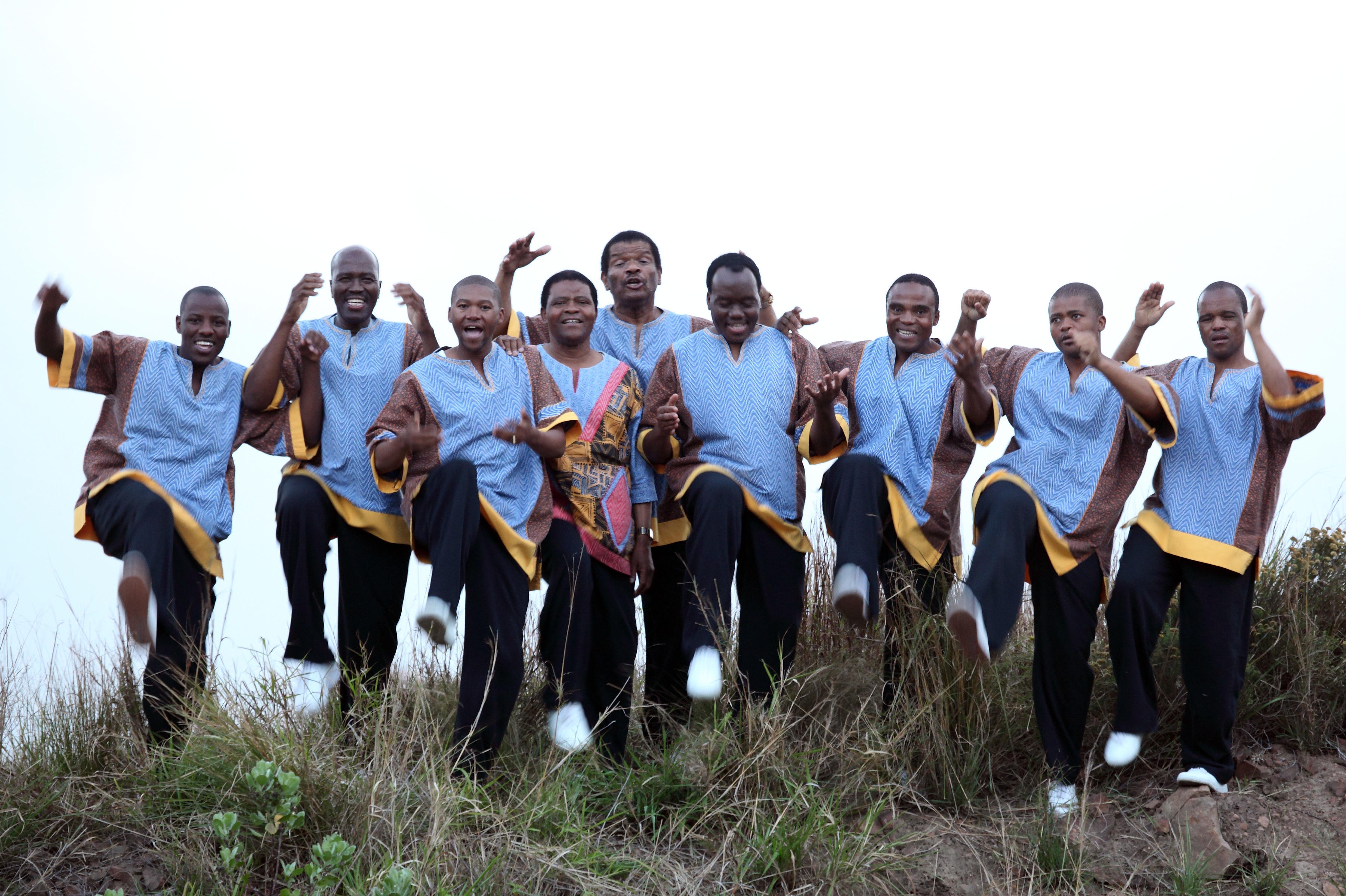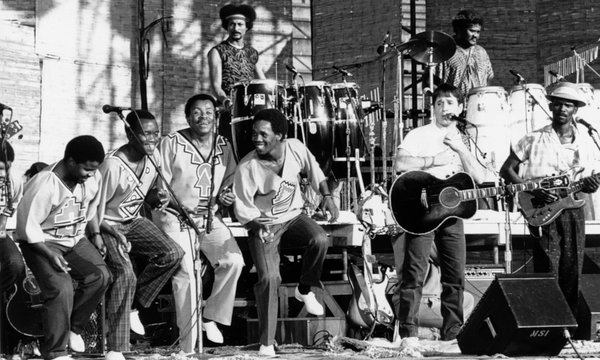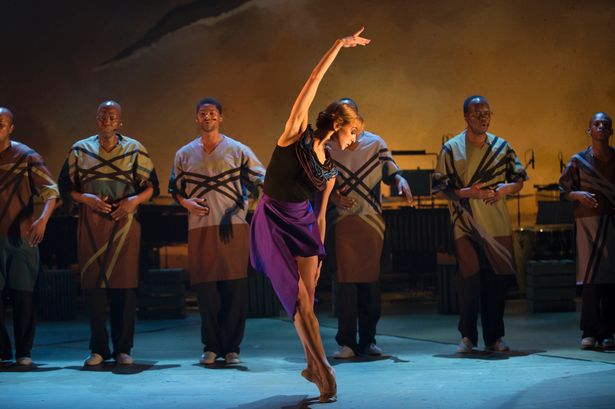Ladysmith Black Mambazo has put out over 50 records and played all over the world; they're one of the most famous South African bands, perhaps the best-known African group to American audiences, thanks to their collaboration with Paul Simon on Graceland. They're big in every way, having had over 30 members in the course of their career, but their most senior current member, Albert Mazibuko, remembers back when they were writing songs while working as auto mechanics in Durban.
Afropop's Ben Richmond had a chance to talk to Mazibuko on the phone this week. Ladysmith Black Mambazo is touring North America, and playing at New York's Town Hall on Fri., Feb. 19.
Mazibuko was about to fly to Los Angeles for the Grammys. The band's latest album, Music From Inala: A Zulu Ballet was a collaboration with the British composer Ella Spira, and was accompaniment for a Western-style ballet that was "infused" with South African dancing from you-know-who. It also earned the group's astounding 16th Grammy nomination. But before heading out, Mazibuko talked about getting fired from his mechanic job, how Graceland changed their lives 30 years ago, and why he won't leave the tenor part to the young guys. Always a team player, Mazibuko didn't want us to use a picture of just him without the band, but he's second from the left in the top photo there.
Ben Richmond: You're headed to the Grammys, you're playing at Town Hall in New York Friday, could you contrast this with what you were doing when you started with the band in 1969? What were you doing before you joined the group?
Albert Mazibuko: I was working as an auto mechanic and Joseph Shabalala was also working there. In fact, he was the one who brought me to the company because after I left Ladysmith, and went to Durban, I was working in a factory, an asbestos factory and Joseph said “No, the money's too small there,” so he introduced me there, so I was working with him. It was easier for us because that's where he was writing most of the songs at the time, but we didn't have any recorders so any songs had to come from him. So he'd run up to me and say “This is the song we need to work on when we get home.” I was working there until about 1973 when we were fired because we weren't always working while we were there. [Laughs]
You didn't have a recording until the '70s when you were on the radio.
Yeah, 1970, we recorded on the radio and then after that a producer from Johannesburg heard us on the radio, so he came to look for us but first of all he went to Ladysmith but we were living in Durban. Ladysmith is our hometown, so we were from there and we'd go there on holidays. He finally found us and we went there in 1970, signed a contract in 1972 and in 1973 it was released.
When you started out were they traditional songs or were these original songs right from the beginning?
At the halls when we were performing and entertaining each other, we were singing songs that everyone knew because we didn't want them to find out about our new way of singing, Joseph said. But at competition we sang our own songs, and those were the ones that had us winning all the competitions until we were fired from competing.
And what were the '70s like then? With the records, your potential audience really starts to grow.
Yes, it started around South Africa and southern Africa, like in Swaziland and Zimbabwe and after that we got an invitation in 1980 to go to Germany. That was a big deal, and then after that it got bigger.
Of course, we're at the 30-year anniversary of Graceland coming out. Did that album change a lot for you? I suppose your American audience must have grown, but did that change life for you guys?
It changed tremendously. It changed everything. Because after Graceland our—well, I don't even know what words I can use, but it just blew us away. Although we were already successful in southern Africa and South Africa, we already had 25 albums all selling very very well, but after Graceland everything went so well. Money was coming in and life was good. What else can I say? Everything went so well. It was wonderful.
You know, collaborating with Paul Simon, it was a blessing to us. It helped the group so well. He introduced us to a world state that we never saw.
You already had 25 albums that already came out before meeting Paul Simon, but I imagine they must've been hard to find outside of South Africa or southern Africa.
Those albums were available in southern Africa, but some people who came to those countries would then buy our music, especially in America. Paul Simon before he came to South Africa, his friend from Los Angeles went to South Africa and bought our records—a bunch of them. So when he heard that Paul Simon was going to South Africa, he wanted to make sure he could find these guys. And so when he came to South Africa that's why he was looking for us.
He looked you up right away.
Yeah, our music was known outside Africa that much.
After the album came out, were you aware your group had become almost a face of the art of South Africa for a lot of the international audience?
No, but that was our dream, but we didn't know that.
When did you realize that you were carrying that distinction?
You know, we never doubted that what we got was important, but I remember when it dawned to me that we had something big. I remember in the small country Swaziland, we went there to perform in 1973, and we were going to perform in a stadium. When we went there in the morning we were just passing by on our way to the hot springs—our promoter took us to the hot springs in the morning before the show started at one in the afternoon. When we passed by there we saw so many buses lining up and people were lining up in a big queue—a long queue, like a kilometer. And we said where are people going? And the promoter said, they're coming for you. And we said “What?” The stadium was 55,000 and it was only for Ladysmith Black Mambazo. He told us that what we had was much more than what we thought we had. So from there on we were playing big halls and stadiums and we just thought “wow.” But it kept growing. And then we were all amazed by what happened, and when we worked with Paul Simon...it was amazing.
Did that change how you worked? Did your popularity change the music?
No, we weren't going to change the music; the music was going to stay the same. We discussed that the messages might change with the time, because we're trying to reflect what was happening in people's lives. Our music is supposed to encourage you and give you hope and tell you that if things are not fine today, then tomorrow they will be all right.
So we're not going to change the music, that's what we're striving for. The South African music, the traditional music stays. But we do work with other people and that teaches us to sing any kind of music now. We've been so grateful that we have younger guys now in the group, people who understand other genres and music that they make, and makes us able to collaborate with anybody and sing with anybody. So for the record that is nominated at the Grammys we collaborated with dancers, and we're singing with piano, so we're always letting new things in, but our music is going to stay the same.
You mentioned that now you have new, younger musicians who are coming in. At the beginning this was very much a family band. Are the new musicians also relatives?
Most of them are relatives. For instance, we have four sons from Joseph Shabalala, and we were joined by a grandson, but he had to go back to go back to school. And we were joined by the son of our other senior member, Russel Mthembu, who stopped touring towards the end of last year. So we kept it in the family, but we do have some other people who are not related but who are friends. Because if someone is really talented and disciplined, we want them in the group. We're not going shut all the people out.
Are you still singing the tenor line?
Yes, I'm still singing tenor. You know the young guys they said, now you should sing the lead parts because you know them, but I said, “No, you guys are going to sing the lead parts, because I want to sing tenor because I want to be able to listen. If I'm singing the lead maybe I'll not be able to hear what the blending is doing. Because the important part of our music is the voice blending.
The tenor part is too important to leave to the new guys?
Absolutely, because you know tenor is the voice that keeps the key. That's the whole thing: the tenor has to listen to the lead. When the lead starts the song because we don't use any instruments to get the key, we hear the key by ear. So when the lead starts the song, the tenor has to make sure he hits the right note and everyone else knows when he's hitting the right note.
Everyone else is taking their cues from you?
Yes, absolutely.
And you can still hit the high notes and everything? You've been taking good care of your voice?
Yes, I'm taking care of my voice and I can still hit any high note I have to do. That's the other thing I've found out: the voice doesn't age.
You must have a good warm-up ritual then to get ready. What do you all do to get ready before a show?
Yes, first we warm our spirits by sitting together, and talking about everything. And then after that we do some stretches, we do some singing and some rehearsals and then we patch up songs there and there, if there's something we want to add. We do that every night before we go on stage: We stretch and then we pray together and we sing two or three songs that we're going to do to make sure they're in the right key for our voices, and then we tell the one who's leading “Maybe the voice isn't as good tonight; that's O.K., just don't put it too high of a key.”
I was listening to the latest album, Music From Inala: A Zulu Ballet, this morning. It's really beautiful, and a bit of a change from work you've done. This is the most orchestral accompaniment I've heard you sing with. Did you bring your own songs to Ella Spira, or did she have some melodies that she wanted you to work with? How did the collaboration work?
Ella Spira had an idea and we just went to meet with her, but she didn't have the songs. She had the stories and the kind of songs she wanted to write for them. And we said, O.K., it went two ways. We'd sing a song for Ella, and she'd try to fit it in with her piano, so we'd do that on a rough recording and she'd go to polish it in her way and write the rest of it. And when she'd come back at our next meeting and she'd play what she'd done and say “O.K., maybe here we can change this, or do it this way.” But most of the songs came just natural. Sometimes she'd just play and we'd listen and put the lyrics and melody to them.
There's a stage play, was there a story that goes with it?
Yeah, the stage play was very good because there was ballet dancers. So while we sang our song and did our own dancing infused with their dancing, and learned some few dances from the ballet. Of course ballet is really challenging; I remember watching them and just thinking, “Wow!” But we taught them our way of dancing a little bit too.
Now you've got a tour across North America in the winter and spring.
Yeah, every year that we come to America, we come when its cold. And that's the question I always ask “Why are we coming here in the cold?” But I think they were aiming for Black History Month, and also they've found that people want more entertainment in the rooms when its winter. When it's summer people want to go outside. So we're here to warm those cold people with our voices and our music.











